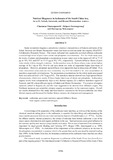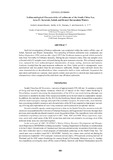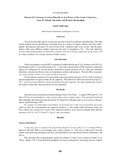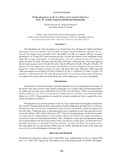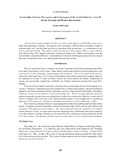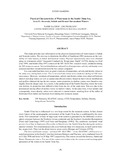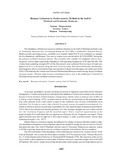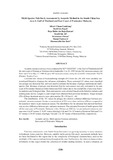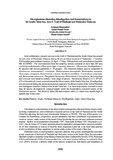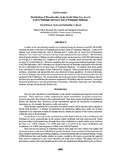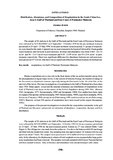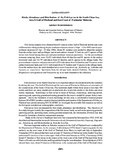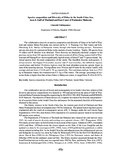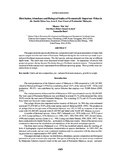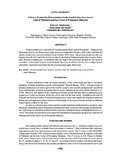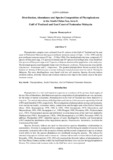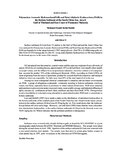01 SEAFDEC/TD Publications: Recent submissions
401-420 / 1030
-
Nutrient Diagenesis in Sediments of the South China Sea, Area II: Sabah, Sarawak, and Brunei Darussalam Waters
(Training Department, Southeast Asian Fisheries Development Center, 1999)Study on nutrient diagenesis and physico-chemical characteristics of bottom sediments of the Sabah, Sarawak and Brunei Darussalum waters had been carried out under the ongoing SEAFDEC Collaborative Research Project. The ... -
Sedimentological Characteristics of Sediments of the South China Sea, Area II: Sarawak, Sabah and Brunei Darussalam Waters
(Training Department, Southeast Asian Fisheries Development Center, 1999)Surficial investigation of bottom sediments was conducted within the waters off the coast of Sabah, Sarawak and Brunei Darussalam. Two sampling of bottom sediments were conducted, one before (September 1996) and one after ... -
Dissolved Carbonate-carbon Dioxide in Sea Water of the South China Sea, Area II: Sabah, Sarawak and Brunei Darussalam
(Training Department, Southeast Asian Fisheries Development Center, 1999)Dissolved carbonate species in seawater are determined from pH and total alkalinity. The data clearly pointed out the significance of Rajang River as a source of organic matters that were subsequently decomposed and cause ... -
Ortho-phosphate in the Sea Water of the South China Sea. Area II: Sabah, Sarawak and Brunei Darussalam
(Training Department, Southeast Asian Fisheries Development Center, 1999)The distribution of ortho-phosphate in the South China Sea off Sarawak, Sabah and Brunei Darussalam waters was studied in the SEAFDEC Interdepartmental Collaborative Research Survey : Area II. The samples were collected ... -
Geostrophic Current, Divergence and Convergence in the South China Sea, Area II: Sabah, Sarawak and Brunei Darussalam
(Training Department, Southeast Asian Fisheries Development Center, 1999)Current and circulation patterns for the area where water depth exceeded 500 m were calculated from geostrophic balance. Divergence and convergence inferred from horizontal circulation matched quite well with the observed ... -
Physical Characteristics of Watermass in the South China Sea, Area II: Sarawak, Sabah and Brunei Darussalam Waters
(Training Department, Southeast Asian Fisheries Development Center, 1999)This study provides new information on the physical characteristics of water masses in Sabah and Sarawak waters. The aim was to determine the effect of Southwest (SW) monsoon on the variability of water masses, in Sabah ... -
Biomass Estimation by Hydro-acoustic Methods in the Gulf of Thailand and Peninsular Malaysia
(Training Department, Southeast Asian Fisheries Development Center, 1999)The abundance of fisheries resources and their structure in the Gulf of Thailand and East coast of Peninsular Malaysia were investigated during the SEAFDEC Collaborative Research Survey. Hydro-acoustic surveying using a ... -
Multi-species Fish Stock Assessment by Acoustic Method in the South China Sea Area I: Gulf of Thailand and East Coast of Peninsular Malaysia
(Training Department, Southeast Asian Fisheries Development Center, 1999)Acoustic resource surveys were conducted by M/V SEAFDEC in the Gulf of Thailand and off the east coast of Peninsular Malaysia from September 5 to 28, 1995 for pre-NE monsoon season and from April 24 to May 17, 1996 for ... -
Microplankton (including dinoflagellate and foraminifera) in the South China Sea, Area I: Gulf of Thailand and Peninsular Malaysia
(Training Department, Southeast Asian Fisheries Development Center, 1999)Joint collaborative research surveys in the Gulf of Thailand and the South China Sea around the east coast of Peninsular Malaysia during the pre northeast monsoon (4 September - 4 October, 1995) and the post northeast ... -
Distribution of Dinoflagellate Cysts in the Surface Sediment of the South China Sea, Area I: Gulf of Thailand and East Coast of Peninsular Malaysia
(Training Department, Southeast Asian Fisheries Development Center, 1999)To obtain more information on the distribution of dinoflagellate cysts in Thai and Malaysian waters, the surface sediment samples of 48 stations in the Gulf of Thailand and the east coast of Peninsular Malaysia were collected ... -
Distribution of Macrobenthos in the South China Sea, Area I: Gulf of Thailand and East Coast of Peninsular Malaysia
(Training Department, Southeast Asian Fisheries Development Center, 1999)A study on the macrobenthos profile was conducted using the research vessel MV SEAFDEC in almost all parts of the Gulf of Thailand and the East Coast of Peninsular Malaysia. A total of 44 stations were located within the ... -
Distribution, Abundance and Composition of Zooplankton in the South China Sea, Area I: Gulf of Thailand and East Coast of Peninsular Malaysia
(Training Department, Southeast Asian Fisheries Development Center, 1999)The sample of 81 stations in the Gulf of Thailand and the East Coast of Peninsular Malaysia were collected by M.V.SEAFDEC on 4 September - 4 October 1995 for the pre northeast monsoon period and on 23 April - 23 May 1996 ... -
Kinds, Abundance and Distribution of the Fish Larvae in the South China Sea, Area I: Gulf of Thailand and East Coast of Peninsular Malaysia
(Training Department, Southeast Asian Fisheries Development Center, 1999)Fish larvae samples were obtained from 81 stations in the Gulf of Thailand and the east coast of (Peninsular) Malaysia during the pre-northeast monsoon season (4 Sept - 4 Oct 1995) and the post-northeast monsoon (23 Apr - ... -
Species Composition and Diversity of Fishes in the South China Sea, Area I: Gulf of Thailand and East Coast of Peninsular Malaysia
(Training Department, Southeast Asian Fisheries Development Center, 1999)The collaborative research on species composition and diversity of fishes in the Gulf of Thailand and eastern Malay Peninsula was carried out by R. V. Pramong 4 in Thai waters and K.K. Manchong, K.K. Mersuji in Malaysian ... -
Temporal Changes in the Abundance of Macrobenthos in the South China Sea, Area I: Gulf of Thailand and East Coast of Peninsular Malaysia
(Training Department, Southeast Asian Fisheries Development Center, 1999)The ecology of macrobenthic fauna in the Gulf of Thailand and the east coast of Peninsular Malaysia was studied for two periods of time at pre NE monsoon ( 4 Sep.- 4 Oct. 1995 ) and post NE monsoon ( 23 Apr. -23 May, ... -
Distribution, Abundance and Biological Studies of Economically Important Fishes in the South China Sea, Area I: East Coast of Peninsular Malaysia
(Training Department, Southeast Asian Fisheries Development Center, 1999)This paper presents species distributions, composition and biological parameters of major fish species caught from the east coast of Peninsular Malaysia during the one week surveys made in preand post-Northeast monsoon ... -
Primary Production Determination in the South China Sea, Area I: Gulf of Thailand and East Coast of Peninsular Malaysia
(Training Department, Southeast Asian Fisheries Development Center, 1999)Primary production in the Gulf of Thailand and the East Coast of Peninsular Malaysia was determined from in situ fluorescense, light intensity in September-October, 1995 cruise, and from the uptake of radioactive carbon ... -
Distribution, Abundance and Species Composition of Phytoplankton in the South China Sea, Area I: Gulf of Thailand and East Coast of Peninsular Malaysia
(Training Department, Southeast Asian Fisheries Development Center, 1999)Phytoplankton samples were collected from 81 stations in the Gulf of Thailand and the east coast of Peninsular Malaysia during pre-northeast monsoon season (4 Sept. - 4 Oct. 1995) and the post-northeast monsoon season (23 ... -
Biogeochemical Implications of Dissolved Trace Metal Concentration and Distribution in the South China Sea, Area 1: Gulf of Thailand and East Coast of Peninsular Malaysia
(Training Department, Southeast Asian Fisheries Development Center, 1999)Dissolved cadmium, copper, iron, lead and nickel in seawater at different depths were analyzed using the cobalt-APDC coprecipitation technique. The concentrations found were low and within the range found in natural seawater ... -
Polynuclear Aromatic Hydrocarbon (PAH) and Total Aliphatic Hydrocarbon (TAH) in the Bottom Sediment of the South China Sea, Area I: Gulf of Thailand and East Coast of Peninsular Malaysia
(Training Department, Southeast Asian Fisheries Development Center, 1999)Surface sediment (0-2cm) from 23 station in the Gulf of Thailand and the South China Sea were analysed for Polynuclear Aromatic Hydrocarbon (PAH), and Total Aliphatic Hydrocarbon (TAH). PAH was found to be in the range ...

